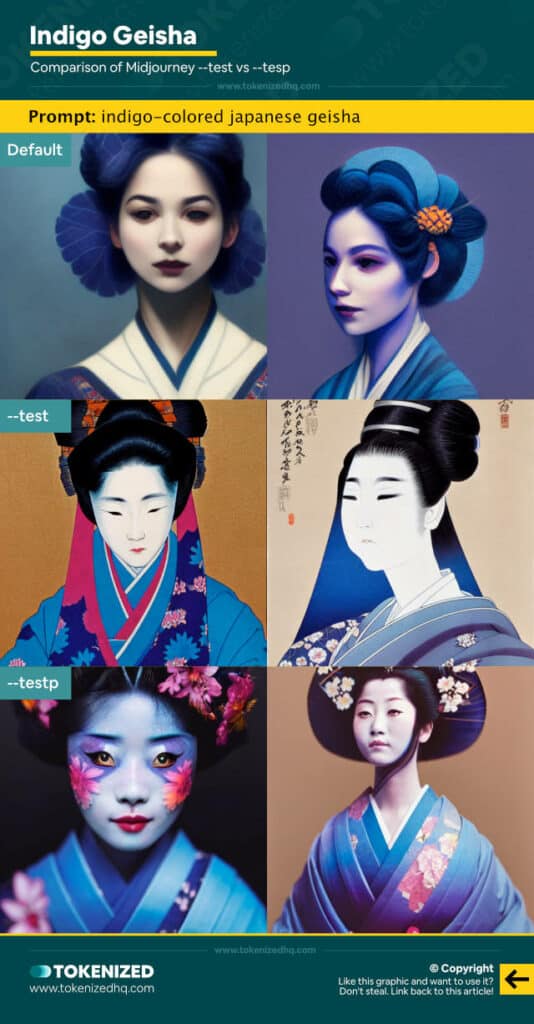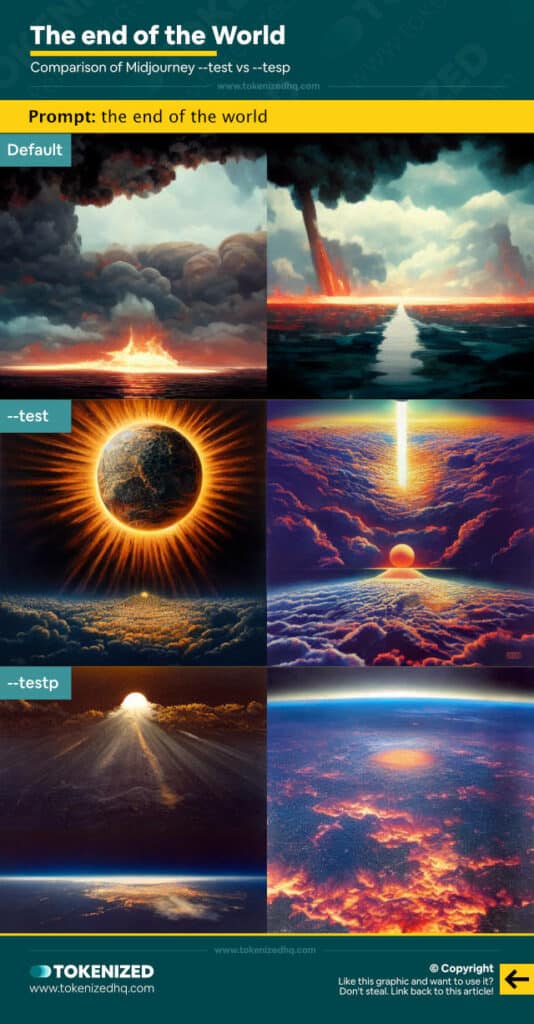Want to know what the Midjourney –test and –testp parameters do?
Even though Midjourney’s official documentation is actually very helpful, you may have noticed that some commands and parameters seem to be missing.
Not all of the experimental features of Midjourney have been documented and a lot of the information is hidden away inside the Midjourney Discord server.
In this guide, we’ll show you what the Midjourney --test and --testp parameters are meant to do and how they impact results.
Let’s dive right in.
Table of Contents Show

Like this content? Then share it!
Explained: Midjourney Test & TestP Commands
www.tokenizedhq.com
Here’s the answer. Great article by @ChrisHeidorn right here: https://tokenizedhq.com/midjourney-test-vs-testp/
What is the Midjourney –test Parameter?
UPDATE (2 April 2023):
Please note that the –test and –testp commands is no longer supported in Midjourney v4 and v5.
In August 2022 the Midjourney team began testing a new image-making system.
The objective of the test was an effort to unify aesthetics and coherence into a single system.
In other words, they were trying to identify how strict it should be when interpreting prompts.
This Midjourney test actually consisted of not 1 but 2 separate test modes:
- –test: A general purpose artistic mode
- –testp: A photo-realism mode
Each mode is invoked by adding the parameter to your command but can also be toggled via the /settings panel in Discord.
Each one of these special modes produces distinctly different images than the default settings.
However, it should be noted that there are some limitations:
- These modes do not support multi-prompts or image prompts.
- The maximum aspect ratios supported are 3:2 and 2:3.
- Each command only makes 2 square images or one non-square image.
- Words at the front of the prompt may matter more than others.
- The system tends to lock onto nouns more than adjectives.
Despite all of the above, we should emphasize that these experimental features and most likely subject to frequent changes.
Key Points (tl;dr)
- Both
--testand--testpare experimental features that were introduced in August 2022. - The objective was to test a new image-making system in an effort to unify aesthetics and coherence into one system.
- While
--testwill produce much more artistic results,--testpdoes the opposite and produces more photo-realistic images.
Side-by-Side Comparison of Images
You’re probably wondering how the Midjourney --test and --testp modes actually differ from the default settings.
The best way to find out is to simply compare different images side-by-side.
We’ve put together a small list of comparisons in order to give you a better feeling about what they do.
By using the Seed command we also make sure that the final results use a similar composition.
1. Indigo Geisha
Here are the prompts we used:
/imagine indigo-colored japanese geisha --seed 1
/imagine indigo-colored japanese geisha --seed 1 --test
/imagine indigo-colored japanese geisha --seed 1 --testp
2. Gandalf the Grey
Here are the prompts we used:
/imagine Gandalf the grey on a mountain --seed 1
/imagine Gandalf the grey on a mountain --seed 1 --test
/imagine Gandalf the grey on a mountain --seed 1 --testp
3. The End of the World
Here are the prompts we used:
/imagine The end of the world --seed 1
/imagine The end of the world --seed 1 --test
/imagine The end of the world --seed 1 --testp
Frequently Asked Questions (FAQ)
Before we close off this guide, let’s quickly address some of the most common questions related to Midjourney download instructions.
-
What is Midjourney Test Mode?
Midjourney’s
--testparameter is an experimental feature that was originally introduced to unify aesthetics and coherence into a single image-making system. The parameter activates a general-purpose “artistic” mode and tends to generate images that look more like art, rather than real objects. -
How are Midjourney Test and TestP different?
The
--testand--testpparameters are both part of the same experimental feature set introduced in August 2022 by Midjourney’s team. While –test produces more “artistic” images,--testpproduces more photo-realistic results.
Conclusion
If you really want to use Midjourney effectively, you’re going to have to learn how to craft effective prompts.
Unfortunately, a lot of the more experimental features aren’t properly documented on Midjourney’s own website and are only explained inside its Discord server.
That’s why we’ve decided to put together this little guide so that you know exactly where to look next time you want to learn more about how Midjourney works.
Here at Tokenized, we want to help you learn as much as possible about the AI software industry. We help you navigate the world of tech and the digitalization of our society at large, including the tokenization of assets and services.



